We asked the Colgate community to weigh in on topics ranging from relationships to careers. See what they had to say.
Relationship
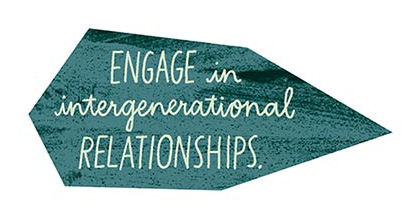
Intergenerational relationships are beneficial for both older and younger individuals, because different life experiences can create meaningful connections, according to Ariel Sherry ’15. “Reflect on your biases or perceptions about people of different ages,” advises Sherry. She’s a senior product manager at Papa, an app aimed at bringing companionship to older adults. Previously, Sherry held multiple roles at Cake, an online platform for navigating the aging process and end-of-life care. “Pretty much every older adult I’ve spoken with has something interesting they can tell you and share about their life,” she says.
To help facilitate these relationships, Sherry suggests employing this mindset: “This is another human being, another person who just happens to be a different age. Recognize that, like with any relationship, they have stuff to teach you and you have stuff to teach them.”
→ “Get off your phone and tune into life around you. Go from 2D to 3D reality. [For example,] when standing in a line or at a counter when another person is directly interacting with you, look them in the eyes, say hello, say thank you, wish them a great day. That small human interaction will make your day better and their day better; I promise the dividends of humanity will continue to pay. Expand your real network, not your virtual one.” — Kelsy Hill ’04 works in strategic branding and integrated marketing and is currently the chief marketing officer at Raglan Motors. She majored in philosophy and political science at Colgate.
→ “You can’t be everything. The sooner you make a conscious choice about what roles you will prioritize (Parent? Friend? Employee? Child? Spouse?), the easier it is to make choices about how you spend your most precious resources — time and energy.” — John Stieger ’96, a Colgate political science major who earned an MBA from Cornell.
→ “The only thing harder than being human is being in any kind of relationship with another human. Learning how to do this is hard, but [it’s] the most valuable tool you will have throughout your life. Developing the ability to set boundaries, to communicate, to be humble and vulnerable and direct. These are the skills that transcend any other in terms of value in life. They will contribute to your success in ways that are profoundly more important than any other skill set as they will also significantly enhance your quality of life. We spend so much time in anxious anticipation of difficult conversations that often never happen because of our fear. This, in and of itself, prevents us from wholly engaging in our life and our relationships.” — Jenny Hecht ’96
→ “People don’t or can’t always show up in your life in the exact way you want them to. But if you can accept this fact and if you do like what it is they consistently bring to the table, you open yourself up to receiving a lot of joy and love from those around you.” — On Tim Tang ’17
→ “Do not be afraid to change your approach to parenting. Instead of being exclusively a parent to your children, become instead a part-time student of your children. Make the effort to learn as much from them as they are learning from you. You will each be rewarded with higher levels of consciousness, awareness, respect, friendship, love, and mutual happiness.” — Dan Christie ’75
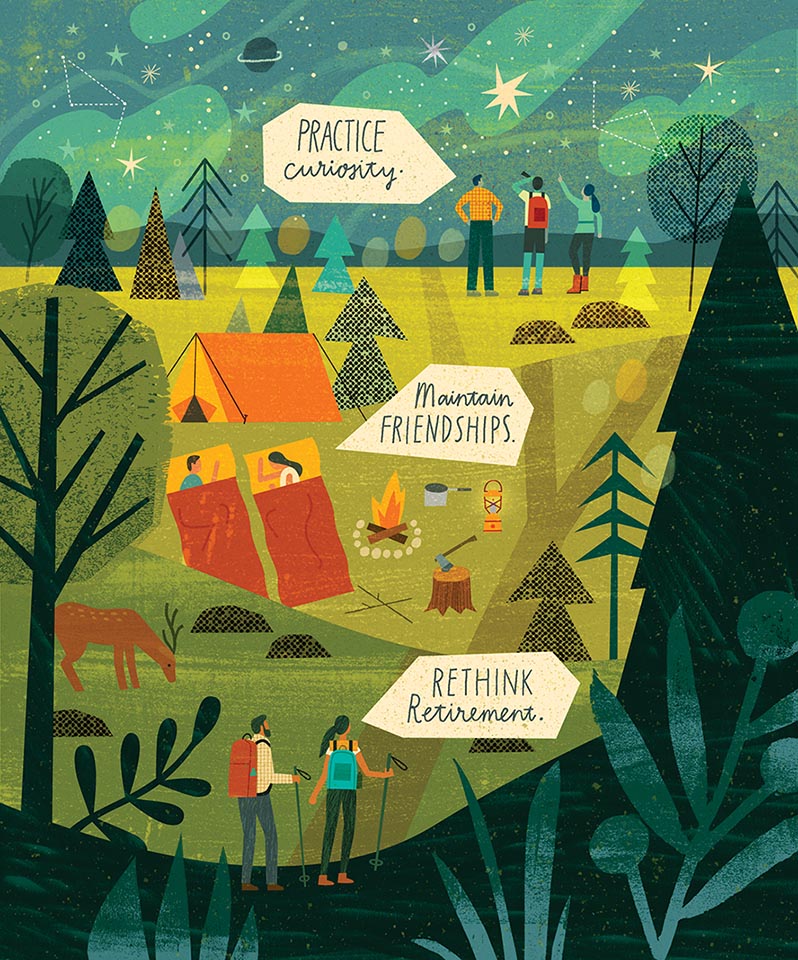
Health
Having a consistent routine before bed may lead to better sleep, says Assistant Professor of Psychology Lauren Philbrook, who studies sleep patterns. That routine signals to your body that it’s time to go to sleep. Also, having a consistent bedtime and wake-up time is helpful in training our circadian rhythms, which the National Institute of General Medical Sciences describes as “physical, mental, and behavioral changes that follow a 24-hour cycle.” Our circadian rhythms respond to light and dark, so it’s natural that our sleep plays a role in keeping them regulated.
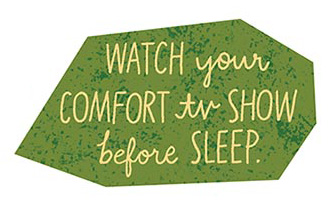
If you’re a nightly TV watcher, that doesn’t mean giving up your guilty pleasure shows in the name of more z’s. “The concern is about the blue light or the cognitive or emotional arousal that comes from the media,” Philbrook says. Her class has been learning from a sleep psychologist who recommends that, if you want to watch a TV show before bed, watch something familiar. Because a familiar favorite won’t be as cognitively or emotionally stimulating, it may not cause as much disruption to your sleep.
Finally, “sometimes the swing from weekend to weeknight can be really difficult on your body,” says Philbrook. To keep yourself from getting drowsy on Monday morning, try keeping your bedtime and wake-up time the same seven days a week.
→ “Walk every day (urban hikes are just fine),” says biology major Allan Bombard ’75, CEO of NVB Partners, Inc. Bombard has spent his career working in the fields of biotechnology, health insurance, and academic medicine. He holds an MD from George Washington University and an MBA from the University of San Diego.
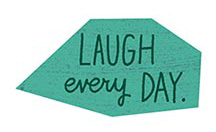
→ “Laugh every day,” says comedian Mark Klein ’76. “When you laugh, your brain releases every chemical in it that’s good for you and none of the ones that are bad. It’s important to find a way to laugh at or with something every day.”
Careers and Education
Professors Scott and Ellen Percy Kraly have spent the majority of their careers on the Hill, teaching the next generation of scholars about psychology and neuroscience (Scott) and geography and environmental studies (Ellen). Throughout their 40 years together, they’ve also maintained a strong relationship and raised two children. Upon their retirement they offer some advice:
On navigating Colgate: If you need help, or if you want to start a new venture and need support, “the starting place, at a place like Colgate, is not to write a memo, not to send an email, not to send a phone message — it’s to walk over to that person’s office and talk to them,” says Scott.
On balancing career and life: “It’s important to maintain friendships on a continuous and consistent basis,” says Ellen. Specifically, she wishes she’d been better at nurturing her female friendships in the community during her career. And if you find yourself entering retirement, start working on reinvigorating those relationships, she notes.
On strengthening their marriage as their careers grew: “As a couple, there were years where I’d come [home], a baby was handed to me, Scott would go out, put in office hours in the evening,” Ellen remembers. “We want to have it all, we can mostly have it all, but there are daily, weekly, and sometimes yearly compromises, where you have to kind of shift and love one another. [My advice is] good communication with one another, knowing that you’re in it for the long haul.”
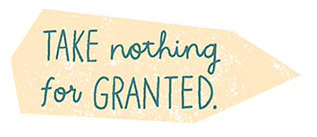
→ “We need to reframe (and rename) retirement,” says Barbara Hessekiel ’84 Waxman, a life coach and gerontologist. “The word itself means to withdraw, to cease. At 65, with decades of living ahead, that is not what people are aspiring to,” the Colgate psychology major notes. Instead, people should live according to their life stage rather than their age. Waxman recommends thinking of retirement as “preferment,” a time devoted to those things that bring a sense of meaning, joy, and impact. “It reflects the decades spent on the activities, roles, and yes, even work, that we prefer to do,” she says.
→ “What I found after graduation was that my ‘perfect job’ was not in any way what I thought it would be. I went from one secondary teaching job to another for five years. I was miserable. Then I was offered a position with Exxon. It was wonderful. I got to use my geology and computer experience. I was there for 33 years. One should not accept a situation if it’s not what you wanted or expected. Keep trying and you will find what fits you best.” — Steve Shapiro ’75, Colgate geology major
→ “Have goals, but don’t be trapped by them,” says screenwriter Ray Hartung ’70. “Don’t get myopic about where you’re going, because along the way, other interesting things could just pop out. And you’ve got to embrace that.”
→ “In order to remain relevant, we must diligently continue to pursue knowledge, or our opportunities will be marginalized. Each of us must view the journey as one of continuous learning. Remember, no one ever died of overexposure to education. In the words of William Butler Yeats, ‘Education is not about filling the pail, but about lighting the fire.’” — Stuart Angert ’62, former CEO of Remarketing Services of America, Inc. Angert is also an active community member in Buffalo, N.Y., and was a commissioner of the New York State Office of Parks, Recreation and Historic Preservation for the Niagara District. In addition to his Spanish degree from Colgate, he earned an MBA from the Wharton School of Business at the University of Pennsylvania in 1965.
→ “Practice curiosity! Ask questions and marvel at the unknowable.” — Janice McSherry ’75, former vice president and associate general counsel for GlaxoSmithKline. In addition to her Colgate sociology and anthropology degree, she earned her JD from the University of Pittsburgh in 1983.
→ “Invest in yourself. I spent a lot of resources on funding other people’s dreams. When I bet on myself I have usually won. Whether that was starting new businesses or continuing my education, the results (even when failure… my CBD Chocolate business went bust) have always been a net positive: we either win or have the opportunity to learn and grow.” — Reed Lewis ’96
→ “Never stop taking classes. There is still so much to learn and so many smart people eager to share their knowledge” — Betsy Burnham ’75 Wallman
→ “There’s a good chance you won’t immediately achieve your life goals, but with patience and persistence you could find satisfaction in an entirely different direction than you expected.” — Bruce Ward ’75
→ “Seek adventure in all aspects of your life and volunteer for new things. We have the education and resources to do virtually anything; it’s up to us to keep life exciting and rewarding.” — Larry Arnold ’63
Death
Everyone who dies deserves to be remembered, whether it’s through a traditional funeral service or an unconventional memorial, says Alan Benedict ’61. Benedict is a fifth-generation funeral director who has spent his career helping others grieve their loved ones in ways that feel authentic to the deceased. For example, one woman Benedict cared for had a passion for knitting, so his funeral home placed her afghans around the room during her memorial service. Benedict says services have been trending away from expensive, reserved memorials and more toward honoring the deceased in a unique way. “Things are much more personal than they were.” His advice: Just make sure you do something in memory of your loved one. Because people are living longer lives these days, they’re often left with a smaller network at the end of their lives. “My major concern is that [some] people are doing nothing,” Benedict says. Even a small memorial service to remember someone is better than nothing.

Also, when helping a loved one at the end of life, consider hospice care, suggests Benedict. Over the years, he’s seen the ways end-of-life care has transitioned to a “death with dignity” approach that hospice care provides. “It has really taught our country a lot about how to handle people in this stage of death.”
→ Daisaku (Dai) Yamamoto, associate professor of geography and Asian studies, teaches the course Is the Planet Doomed?, which is more positive than it sounds: “I bring the students to this question of, basically, how we can perish better? Of course, we will all be doomed in the long run. We know in about a billion years, Earth is not going to be habitable for any creatures. But even in the short term, I think many of us are worried about it,” he says. Yamamoto’s advice: “Instead of being so preoccupied with the issue of survival, we should probably focus on how we can live and die better.”
→ “In the words of the late and truly great Lin Brehmer ’76: ‘Take nothing for granted. It’s Great to Be Alive!’” Mary Clare (Greabe) ’86 Bonaccorsi says, quoting the famous Chicago radio DJ who died in January.
→ “Tell people you love them while you can. After they’re gone, it’s too late.” — Chuck Dickemann ’78
Mindset
→ “Every three months, turn down the lights, open a bottle of wine, and listen to Dylan’s Blonde on Blonde and Marvin Gaye’s What’s Going On.” — Dave Huston ’75
→ “Buy a Mega Millions lottery ticket,” says economics major Glen Howell ’75. “[Then] imagine how you will change your life if you win. Gives you perspective on what is important to you.”
→ “In 2021, data from NASA’s New Horizons space probe was used to revise the earlier estimate of the number of galaxies in the universe to roughly 200 billion (2×1011). All of your problems are small.” — Alex Choniski ’04
→ “Fall in love with the life you live. Every. Single. Day.” — Kay (Traester) LaBanca ’05
→ “Know your worth. This is essential as you grow/evolve and navigate dating, selecting a life partner and friendships, and your career. If you find yourself doubting your worth as a person in the worlds in which you are involved, reach out to trusted people to have them remind you!” — Kaori Nakamura ’93
→ “The sooner you realize that there is no universal ‘better life,’ the better. What works for one person might not work for the other. Your only competition is yesterday’s you. Don’t be afraid to try new things and figure out what’s the best life for you. It’s never too late to start in a new direction if the current one makes you miserable.” — Kroum Sourov ’04
→ “Focus on today, not yesterday. Value what you have, more than what you’ve lost.” — Phil Bramson ’75
→ “As you travel along your personal life’s journey, work hard to be a better listener.” — Peter J. Beucher ’75
